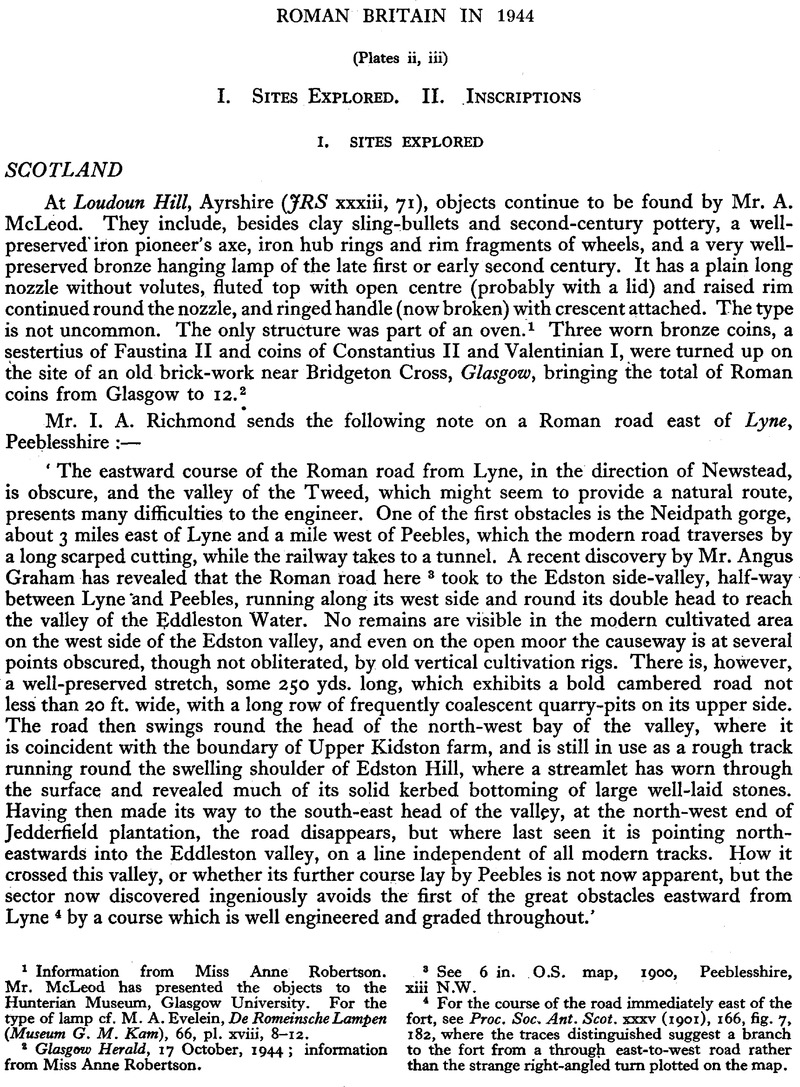No CrossRef data available.
Published online by Cambridge University Press: 24 September 2012

1 Information from Miss Anne Robertson. Mr. McLeod has presented the objects to the Hunterian Museum, Glasgow University. For the type of lamp cf. Evelein, M. A., De Romeinsche Lampen (Museum G. M. Kam), 66, pl. xviii, 8–12Google Scholar.
2 Glasgow Herald, 17 October, 1944; information from Miss Anne Robertson.
3 See 6 in. O.S. map, 1900, Peeblesshire, xiii N.W.
4 For the course of the road immediately east of the fort, see Proc. Soc. Ant. Scot. xxxv (1901), 166, fig. 7, 182Google Scholar, where the traces distinguished suggest a branch to the fort from a through east-to-west road rather than the strange right-angled turn plotted on the map.
5 Horsley, Britannia Romana (1732), 142; Bruce, Roman Wall (edn. 3), 134.
6 Bruce, Handbook to the Roman Wall (edn. 2), 86; (edn. 9), 78.
7 Arch. Ael. ser. 4, xix, 13–17.
8 Information from Mr. J. B. Jackson sent by Miss M. C. Fair.
9 Major E. Hildyard sent the typescript of his report which will be published in the Cumb. & West. A. & S. Trans. The amphora-stamp VIRI was found unstratified in topsoil outside Building I.
10 Yorks Gazette, 10 March, 1944; Yorks. Arch. Journ. xxxvi, 249.
11 JRS xxix, 204; xxxi, 131; and Yorks. Arch. Journ. xxxvi, 250.
12 Information sent by the Rev. Angelo Raine and a sketch-plan by the City Engineer.
12a Yorks. Arch. Journ. xxxvi, 249.
13 Information from Professor Newstead and from Mr. G. B. Leach; cf. also Chester Arch. Soc. Proc. xxxv, 58 f.
14 Lancs. & Cheshire Hist. Soc. Trans. 1901.
15 Information from Mr. H. E. Dudley of Scunthorpe Museum, where the brooch now is; it is to be published by Mr. M. R. Hull in Antiqs. Journ.
16 Cf. JRS xxviii, 189; the bronze boar is of the Roman type with crest and a twisted tail; it is well modelled and hollow, probably meant to be filled with lead and attached to some object. It is the property of Rev. J. Blake, of Rickinghall.
17 Invent of the Hist. Mons. of Essex (RCHM) iii, 21 f. Mr. Hull also sent the drawing (fig. ii).
18 Cf. The Times, 2 Jan., 1945. Information from Mr. D. B. Harden.
19 Information from Dr. St. Joseph and F/Lt. D. N. Riley. The earthwork is mentioned in VCH Notts i, 303, ii, 33, where potsherds and part of a spear are said to have been found there in 1750.
20 Now in the collection of Mr. Elborne.
21 Siemens Magazine, April–May, 1944, p. 68.
22 Oxoniensia viii; cf. Invent. of Hist. Mons. of Bucks (RCHM) ii, 62.
23 Information and plan from Mr. and Mrs. O'Neil. For a graffito found in the excavations, see p. 92, no. 8.
24 Found by Mrs. Atkinson, of the Post Office, Coin St. Aldwyn. See below, p. 91, no. 6, for an inscribed weight found a mile or so away.
25 Arch. Journ. lxxxvii, 1930, 306 ffGoogle Scholar.
26 For infant burials in relation to houses see Wheeler, R. E. M. and T. V., Verulamium (Soc. Ant. Research Reports, xi, 1936), 138 fGoogle Scholar.
26a The site had been noted and watched for some time by Mr. C. E. Bean, of Sherborne.
27 Dorset N.H. & Antiqs. Soc. Proc. lxv, 53 ff. Mr. Smith summarises the objects of Early Iron Age and Roman date found in the gravel pit.
28 Wilts Arch. Mag. l, 495.
29 A catalogue and report by Mr. E. T. Leeds will be published by the Ashmolean Museum, where the hoard has been deposited by St. John the Baptist College, Oxford, on whose land it was found.
30 Archaeohgia xix, 182, pl. 14, and Lysons, Reliquiae Britannico-Romanae ii, pl. xxxiii bis; cf. similarly-shaped rooms at Keynsham, Somerset (Arch. lxxv, III), and at Loose Road, Maidstone, which is heated (VCH Kent, iii, 100).
31 VCH Somerset i, 326 f., fig. 85; cf. Frampton, Lysons, op. cit., i, pl. iv, v.
32 Information from Mr. Morley Hewitt, who also kindly sent the drawing shown in fig. 13.
33 Information and plan from Mr. S. S. Frere.
34 The work was carried out by the enterprise of Major Tomlinson and a band of volunteers under the supervision of Mrs. Audrey Williams for the Ministry of Works. We are indebted to her and to Mr. I. A. Richmond for information. A map of Canterbury showing previous discoveries is to be found in Vict. Co. Hist. of Kent, iii, 62, pl. xii.
35 Information from Mr. W. P. Blore. The potsherds are in the Cathedral Library.
36 When measurements are quoted the width precedes the height. The following abbreviations are used in addition to the usual ones, with superscript figures to denote the number of the series: AA = Archaeologia Aeliana; AAA = Liverpool Annals of Archaeology and Anthropology; CASJ = Chester Archaeological Society's Journal; CW = Cumberland and Westmorland Transactions; EE = Ephemeris Epigraphica.
37 Lt.-Col. Eric Birley kindly gave facilities for its study.
38 CW2 XXXV (1935), 285Google Scholar, with pl.; JRS XXV (1935), 205Google Scholar, pl. XXX.
39 Information kindly supplied by Professor Ó Ríordáin and Dr. P, Jacobsthal.
40 BM Guide Rom. Brit. 86, pl. iii.
41 Cf. Curle, Treasure of Traprain, pl. xiv.
42 EE ix, 1257; Evans, , Num. Chron.4 XV (1915), 517Google Scholar.
43 Willers, Die roemischen Bronzeeimerv on Hemmoor 228 f; Evans, , Num. Chron.4 XV (1915), 488 ffGoogle Scholar.
44 Lent to the Ashmolean Museum by Mrs. Atkinson, of Coin St. Aldwyn, for study. Details and photograph kindly supplied by Mr. R. J. C. Atkinson. See above, p. 86.
45 Professor Newstead kindly supplied drawings for the block.
46 See above, p. 86.